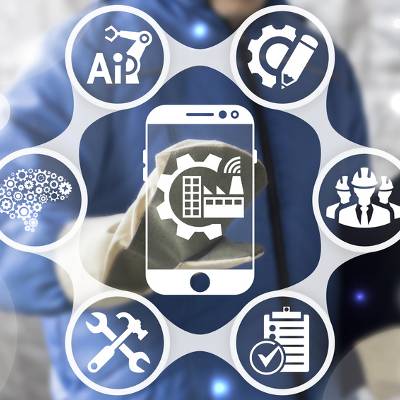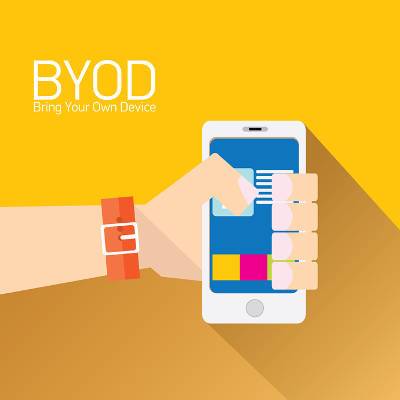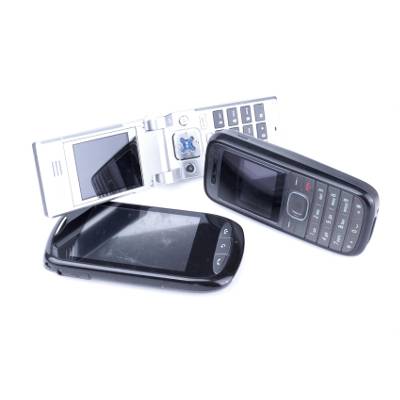Would your company fall apart if communications were interrupted? This is one of the significant pitfalls that businesses have to deal with, as without formal teamwork and communication, operations can fall apart and productivity can plummet. What are some of the ways that your company manages the numerous modes of communication that it relies on?
Macro Systems Blog
The current business environment is no longer merely an office setting filled with workstations. The office is the coffee shop down the road, or the airport lobby where you're waiting for a flight. It’s the client’s office while you’re out on a business trip, or the venue for a business conference where you make valuable connections and exchange contact information. The office has gone mobile; your organization needs to adapt to this shift.
Businesses can profit from the use of personal mobile devices in the workplace, but there are also dangers in allowing mobile and Internet of Things devices to access your network. In order to reduce these risks, you need to put some limits and guidelines on the use of such devices in the workplace.
Mobile devices have a prevalent place in the modern office. In fact, a recent study by Gartner found that 80 percent of all employees bring their personal mobile device with them to work. This Bring Your Own Device (BYOD) trend comes with a host of benefits, like improved productivity and employee morale, but it increases the risk of a corporate data breach if not properly managed. How should a concerned business owner respond to this trend?
 Apple is back with another iPhone! The Silicon Valley-based hardware and software manufacturer has released the new versions of their extremely popular iPhone series of devices. The two-headed approach that Apple took with their second incantation of the iPhone 5 (the 5s and 5c), is replicated this time out as well. After being surpassed by Samsung over the past two years, does the iPhone 6 and its larger version, the iPhone 6+, have what it takes to get Apple back on top?
Apple is back with another iPhone! The Silicon Valley-based hardware and software manufacturer has released the new versions of their extremely popular iPhone series of devices. The two-headed approach that Apple took with their second incantation of the iPhone 5 (the 5s and 5c), is replicated this time out as well. After being surpassed by Samsung over the past two years, does the iPhone 6 and its larger version, the iPhone 6+, have what it takes to get Apple back on top?
 Mobile computing is literally everywhere; and, yes, that's the point of the technology. The mobile computing boom has presented major retailers with the opportunity to begin offering smartphones and tablets. The world's largest online retailer, Amazon, is the next company to launch a mobile device platform, by offering their new "Fire" smartphone, CEO Jeff Bezos announced on June 18th.
Mobile computing is literally everywhere; and, yes, that's the point of the technology. The mobile computing boom has presented major retailers with the opportunity to begin offering smartphones and tablets. The world's largest online retailer, Amazon, is the next company to launch a mobile device platform, by offering their new "Fire" smartphone, CEO Jeff Bezos announced on June 18th.
 The entire purpose of equipping your business with technology is to save you money while making you money. When technology costs you more money than it should, you will want to change your tech situation to better suite your needs. This is an example of the classic money management strategy, "only pay for what you need."
The entire purpose of equipping your business with technology is to save you money while making you money. When technology costs you more money than it should, you will want to change your tech situation to better suite your needs. This is an example of the classic money management strategy, "only pay for what you need."
 It's no secret that Microsoft is trying to implement a full court press regarding the Windows RT operating system by trying to get it on as many tablets and phones as possible. However, up until this point the only company still producing these devices was Microsoft itself. Now Nokia has entered the fray with their Lumia 2520. Microsoft recently purchase Nokia, however, the merger will not be complete until sometime next year, so this still feels, looks like, and operates the way you would expect a Nokia product to.
It's no secret that Microsoft is trying to implement a full court press regarding the Windows RT operating system by trying to get it on as many tablets and phones as possible. However, up until this point the only company still producing these devices was Microsoft itself. Now Nokia has entered the fray with their Lumia 2520. Microsoft recently purchase Nokia, however, the merger will not be complete until sometime next year, so this still feels, looks like, and operates the way you would expect a Nokia product to.
 What is the scariest situation you can imagine? Being chased by a werewolf? How about being boiled alive in a witches brew? Or what about succumbing to a zombie hoard? For people that are nomophobic, these monster-filled situations would be preferred compared to their greatest fear; being without their cell phone!
What is the scariest situation you can imagine? Being chased by a werewolf? How about being boiled alive in a witches brew? Or what about succumbing to a zombie hoard? For people that are nomophobic, these monster-filled situations would be preferred compared to their greatest fear; being without their cell phone!
 According to a new study from the International Data Corporation, tablets are expected to outsell PCs for the first time in the fourth quarter of 2014. While mobile device sales have been trending this way for years, this is the first time the mighty PC will be dethroned by a gadget. What does this mean for your business?
According to a new study from the International Data Corporation, tablets are expected to outsell PCs for the first time in the fourth quarter of 2014. While mobile device sales have been trending this way for years, this is the first time the mighty PC will be dethroned by a gadget. What does this mean for your business?
 We’re all aware of how the proliferation of mobile devices is changing the workplace, but let’s take an objective look at this trend. Are mobile devices changing the workplace for the better? Are employees actually using their personal devices to get more work done? Or, is the BYOD trend a bunch of hype and nothing’s really changed? Let’s find out.
We’re all aware of how the proliferation of mobile devices is changing the workplace, but let’s take an objective look at this trend. Are mobile devices changing the workplace for the better? Are employees actually using their personal devices to get more work done? Or, is the BYOD trend a bunch of hype and nothing’s really changed? Let’s find out.
 When was the last time you let your phone’s battery die on you? Due to the takeover of mobile technology in the workplace, smartphones have basically become inseparable from their owners, particularly the ever-busy business owner. Despite the imperative role that smartphones have in the workplace, you should know that there are several battery myths that might be holding you back from achieving maximum efficiency with your device.
When was the last time you let your phone’s battery die on you? Due to the takeover of mobile technology in the workplace, smartphones have basically become inseparable from their owners, particularly the ever-busy business owner. Despite the imperative role that smartphones have in the workplace, you should know that there are several battery myths that might be holding you back from achieving maximum efficiency with your device.
 Thieves stealing mobile devices like laptops and smartphones have reached epidemic proportions. In fact, 2013 statistics from Consumer Reports and LoJack show that two million laptops were stolen that year, along with three million handsets. Translation; it’s way more likely for your mobile device to be stolen than you probably realize.
Thieves stealing mobile devices like laptops and smartphones have reached epidemic proportions. In fact, 2013 statistics from Consumer Reports and LoJack show that two million laptops were stolen that year, along with three million handsets. Translation; it’s way more likely for your mobile device to be stolen than you probably realize.
 Mobile devices in the workplace are a complex conundrum that many organizations don’t know how to face properly. On one hand, they allow workers to stay ahead of their schedules, and let them stay productive even when they’re not in the office. On the other hand, they present a serious security risk that needs to be addressed. How does your business handle mobile devices in the workplace?
Mobile devices in the workplace are a complex conundrum that many organizations don’t know how to face properly. On one hand, they allow workers to stay ahead of their schedules, and let them stay productive even when they’re not in the office. On the other hand, they present a serious security risk that needs to be addressed. How does your business handle mobile devices in the workplace?
 How many of your employees have a smartphone? The answer is probably most (if not all) of them. In the United States alone, nearly two-thirds of adults own a smartphone, and many of them depend on the device to do much of their personal computing. As a result, many workers, even if they are instructed not to, will use their devices while at your office. This is why many companies have put in place a comprehensive Bring Your Own Device (BYOD) strategy.
How many of your employees have a smartphone? The answer is probably most (if not all) of them. In the United States alone, nearly two-thirds of adults own a smartphone, and many of them depend on the device to do much of their personal computing. As a result, many workers, even if they are instructed not to, will use their devices while at your office. This is why many companies have put in place a comprehensive Bring Your Own Device (BYOD) strategy.








